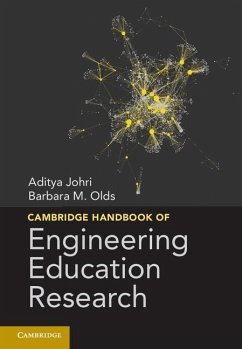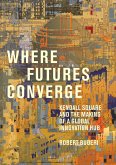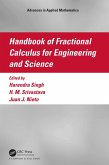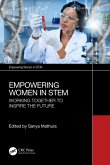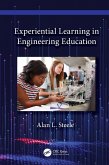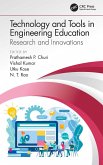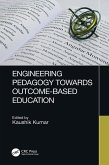Cambridge Handbook of Engineering Education Research (eBook, ePUB)
Redaktion: Johri, Aditya


Alle Infos zum eBook verschenken

Cambridge Handbook of Engineering Education Research (eBook, ePUB)
Redaktion: Johri, Aditya
- Format: ePub
- Merkliste
- Auf die Merkliste
- Bewerten Bewerten
- Teilen
- Produkt teilen
- Produkterinnerung
- Produkterinnerung

Hier können Sie sich einloggen

Bitte loggen Sie sich zunächst in Ihr Kundenkonto ein oder registrieren Sie sich bei bücher.de, um das eBook-Abo tolino select nutzen zu können.
The Cambridge Handbook of Engineering Education Research is the critical reference source for the growing field of engineering education research, featuring the work of world luminaries writing to define and inform this emerging field. The Handbook draws extensively on contemporary research in the learning sciences, examining how technology affects learners and learning environments, and the role of social context in learning. Since a landmark issue of the Journal of Engineering Education (2005), in which senior scholars argued for a stronger theoretical and empirically driven agenda,…mehr
- Geräte: eReader
- mit Kopierschutz
- eBook Hilfe
- Größe: 37.24MB
- FamilySharing(5)
![Where Futures Converge (eBook, ePUB) Where Futures Converge (eBook, ePUB)]() Robert BuderiWhere Futures Converge (eBook, ePUB)22,95 €
Robert BuderiWhere Futures Converge (eBook, ePUB)22,95 €![Handbook of Fractional Calculus for Engineering and Science (eBook, ePUB) Handbook of Fractional Calculus for Engineering and Science (eBook, ePUB)]() Handbook of Fractional Calculus for Engineering and Science (eBook, ePUB)78,95 €
Handbook of Fractional Calculus for Engineering and Science (eBook, ePUB)78,95 €![Empowering Women in STEM (eBook, ePUB) Empowering Women in STEM (eBook, ePUB)]() Empowering Women in STEM (eBook, ePUB)31,95 €
Empowering Women in STEM (eBook, ePUB)31,95 €![Experiential Learning in Engineering Education (eBook, ePUB) Experiential Learning in Engineering Education (eBook, ePUB)]() Alan L. SteeleExperiential Learning in Engineering Education (eBook, ePUB)47,95 €
Alan L. SteeleExperiential Learning in Engineering Education (eBook, ePUB)47,95 €![Technology and Tools in Engineering Education (eBook, ePUB) Technology and Tools in Engineering Education (eBook, ePUB)]() Technology and Tools in Engineering Education (eBook, ePUB)47,95 €
Technology and Tools in Engineering Education (eBook, ePUB)47,95 €![Engineering Pedagogy Towards Outcome-Based Education (eBook, ePUB) Engineering Pedagogy Towards Outcome-Based Education (eBook, ePUB)]() Engineering Pedagogy Towards Outcome-Based Education (eBook, ePUB)47,95 €
Engineering Pedagogy Towards Outcome-Based Education (eBook, ePUB)47,95 €![Handbook of Industrial Engineering Equations, Formulas, and Calculations (eBook, ePUB) Handbook of Industrial Engineering Equations, Formulas, and Calculations (eBook, ePUB)]() Adedeji B. BadiruHandbook of Industrial Engineering Equations, Formulas, and Calculations (eBook, ePUB)71,95 €
Adedeji B. BadiruHandbook of Industrial Engineering Equations, Formulas, and Calculations (eBook, ePUB)71,95 €-
-
-
Dieser Download kann aus rechtlichen Gründen nur mit Rechnungsadresse in A, B, BG, CY, CZ, D, DK, EW, E, FIN, F, GR, HR, H, IRL, I, LT, L, LR, M, NL, PL, P, R, S, SLO, SK ausgeliefert werden.
- Produktdetails
- Verlag: Cambridge University Press
- Erscheinungstermin: 10. Februar 2014
- Englisch
- ISBN-13: 9781107785656
- Artikelnr.: 52967347
- Verlag: Cambridge University Press
- Erscheinungstermin: 10. Februar 2014
- Englisch
- ISBN-13: 9781107785656
- Artikelnr.: 52967347
- Herstellerkennzeichnung Die Herstellerinformationen sind derzeit nicht verfügbar.
engineering education as a field of scientific inquiry Jeff Froyd and Jack
Lohmann; 2. Learning theories for engineering education practice and
research Wendy Newstetter and Marilla Svinicki; 3. Situative framework for
engineering learning research Aditya Johri, Barbara M. Olds and Kevin
O'Connor; 4. The social nature of representational engineering knowledge
Wolff-Michael Roth; 5. Conceptual change and misconceptions in engineering
education: curricular-, measurement-, and theoretically focused approaches
Ruth Streveler, Shane Brown, Geoffrey Herman and Devlin Monfort; 6.
Engineers as problem solvers David Jonassen; 7. Professional engineering
work R. Stevens, Aditya Johri and Kevin O'Connor; 8. Problem-based and
project-based learning in EE - merging models Anette Kolmos and Eric De
Graaff; 9. Case studies in engineering Claire Davis and Aman Yadav; 10.
Curriculum design in the middle years Susan Lord and John Chen; 11.
Engineering design education Cindy Atman, Jim Borgford-Parnell, Janet
McDonnell, Ozgur Eris and Monica Cardella; 12. Adaptive expertise and
knowledge fluency in design and innovation Ann McKenna; 13. Learning
disciplinary ideas and practices through engineering design Janet Kolodner
and Kristen Wendell; 14. Engineering identity Karen Tonso; 15. Studying the
career pathways of engineers: an illustration with two datasets Sheri
Sheppard, Shannon Gilmartin, Samantha Brunhaver and Anthony Antonio; 16.
Retention and persistence in engineering education Gary Lichtenstein, Helen
Chen, Karl Smith and Theresa Maldonado; 17. Social justice and inclusion:
women and minorities in engineering Donna Riley, Amy Slaton and Alice
Pawley; 18. Community engagement in engineering education as a way to
increase inclusiveness Chris Swan, Kurt Paterson and Angela Bielefeldt; 19.
Translating research to widespread practice in engineering education Tom
Litzinger and Lisa Lattuca; 20. Research-guided teaching practices:
engineering threshold concepts as an approach to curriculum renewal
Caroline Baillie and Sally Male; 21. Engineering instruction development:
programs, best practices, and recommendations Rich Felder, Rebecca Brent
and Michael Prince; 22. Understanding disciplinary cultures: the first step
to cultural change Elizabeth Godfrey; 23. Preparing engineering educators
for engineering education research Maura Borrego and Ruth Streveler; 24.
Studying teaching and learning in undergraduate engineering programs:
conceptual frameworks to guide research on practice Lisa Lattuca and Tom
Litzinger; 25. Design-based research in engineering education: current
steps and next steps Anthony E. Kelly; 26. Quantitative and mixed-methods
research: approaches and limitations Barbara Moskal and Teri Reed-Rhoades;
27. Framing qualitative methods in engineering education research:
established and emerging methodologies Jenni Case and Greg Light; 28.
Conducting interpretive research in engineering education Aditya Johri; 29.
The science and design of assessment in engineering education Jim
Pellegrino, L. V. DiBello and Sean Brophy; 30. Engineering communication M.
Paretti, L. McNair and J. Leydens; 31. Use of technology in engineering
education K. Madhavan and E. Lindsay; 32. Global and international issues
in engineering education A. Johri and B. Jesiek; 33. Engineering ethics B.
Barry and J. Herkert; 34. The normative contents of engineering formation:
engineering studies G. Downey; 35. Interdisciplinarity in engineering
practice N. Nerssesian and W. Newstetter; Conclusion.
engineering education as a field of scientific inquiry Jeff Froyd and Jack
Lohmann; 2. Learning theories for engineering education practice and
research Wendy Newstetter and Marilla Svinicki; 3. Situative framework for
engineering learning research Aditya Johri, Barbara M. Olds and Kevin
O'Connor; 4. The social nature of representational engineering knowledge
Wolff-Michael Roth; 5. Conceptual change and misconceptions in engineering
education: curricular-, measurement-, and theoretically focused approaches
Ruth Streveler, Shane Brown, Geoffrey Herman and Devlin Monfort; 6.
Engineers as problem solvers David Jonassen; 7. Professional engineering
work R. Stevens, Aditya Johri and Kevin O'Connor; 8. Problem-based and
project-based learning in EE - merging models Anette Kolmos and Eric De
Graaff; 9. Case studies in engineering Claire Davis and Aman Yadav; 10.
Curriculum design in the middle years Susan Lord and John Chen; 11.
Engineering design education Cindy Atman, Jim Borgford-Parnell, Janet
McDonnell, Ozgur Eris and Monica Cardella; 12. Adaptive expertise and
knowledge fluency in design and innovation Ann McKenna; 13. Learning
disciplinary ideas and practices through engineering design Janet Kolodner
and Kristen Wendell; 14. Engineering identity Karen Tonso; 15. Studying the
career pathways of engineers: an illustration with two datasets Sheri
Sheppard, Shannon Gilmartin, Samantha Brunhaver and Anthony Antonio; 16.
Retention and persistence in engineering education Gary Lichtenstein, Helen
Chen, Karl Smith and Theresa Maldonado; 17. Social justice and inclusion:
women and minorities in engineering Donna Riley, Amy Slaton and Alice
Pawley; 18. Community engagement in engineering education as a way to
increase inclusiveness Chris Swan, Kurt Paterson and Angela Bielefeldt; 19.
Translating research to widespread practice in engineering education Tom
Litzinger and Lisa Lattuca; 20. Research-guided teaching practices:
engineering threshold concepts as an approach to curriculum renewal
Caroline Baillie and Sally Male; 21. Engineering instruction development:
programs, best practices, and recommendations Rich Felder, Rebecca Brent
and Michael Prince; 22. Understanding disciplinary cultures: the first step
to cultural change Elizabeth Godfrey; 23. Preparing engineering educators
for engineering education research Maura Borrego and Ruth Streveler; 24.
Studying teaching and learning in undergraduate engineering programs:
conceptual frameworks to guide research on practice Lisa Lattuca and Tom
Litzinger; 25. Design-based research in engineering education: current
steps and next steps Anthony E. Kelly; 26. Quantitative and mixed-methods
research: approaches and limitations Barbara Moskal and Teri Reed-Rhoades;
27. Framing qualitative methods in engineering education research:
established and emerging methodologies Jenni Case and Greg Light; 28.
Conducting interpretive research in engineering education Aditya Johri; 29.
The science and design of assessment in engineering education Jim
Pellegrino, L. V. DiBello and Sean Brophy; 30. Engineering communication M.
Paretti, L. McNair and J. Leydens; 31. Use of technology in engineering
education K. Madhavan and E. Lindsay; 32. Global and international issues
in engineering education A. Johri and B. Jesiek; 33. Engineering ethics B.
Barry and J. Herkert; 34. The normative contents of engineering formation:
engineering studies G. Downey; 35. Interdisciplinarity in engineering
practice N. Nerssesian and W. Newstetter; Conclusion.
